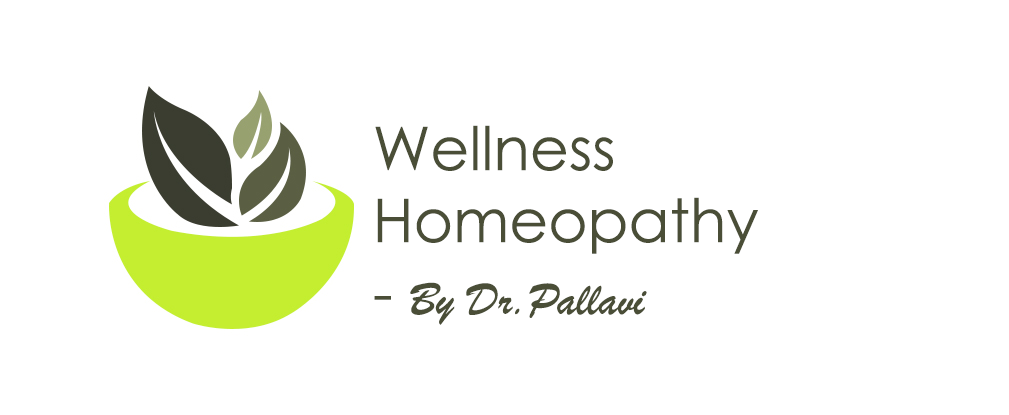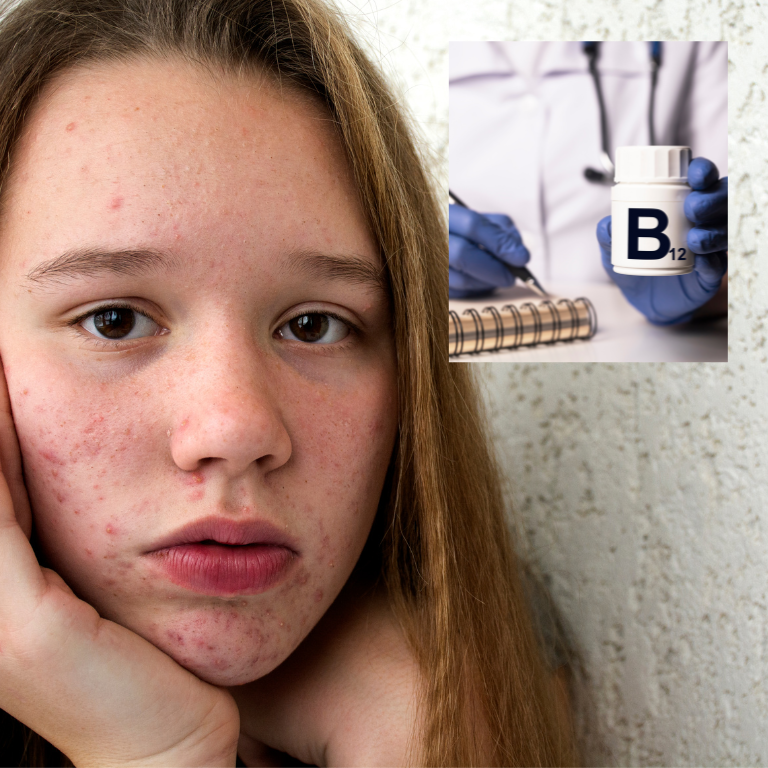Vitamins and minerals are essential for good health, and it is vital to ensure that you get enough of them through a well-balanced diet & use supplements if required.
However, the trend of supplement use is growing rapidly; is it for good? This is an interesting topic I will discuss in another blog.

However, nowadays, a vast majority of people (especially in developed countries) take supplements to help improve their overall health and well-being.
Supplements come in many forms, such as vitamins, minerals, herbs, amino acids, injections, and more, and they can be used to support a wide range of health concerns.
For example, some people take vitamin C to boost their immunity, while others may take fish oil to support heart health.
However, it’s also important to be mindful of the fact that taking too much of any vitamin or mineral can have adverse effects on the body.
Do you know that a supplement recommended by a physician or that an individual chooses to take may not be well-tolerated or cause unwanted side effects?
Vitamin B12 is no exception; taking too much vitamin B12 can lead to acne breakouts. In some cases, excessive intake of B12 may cause other side effects such as headaches, fatigue, dermatological issues, and nerve damage.
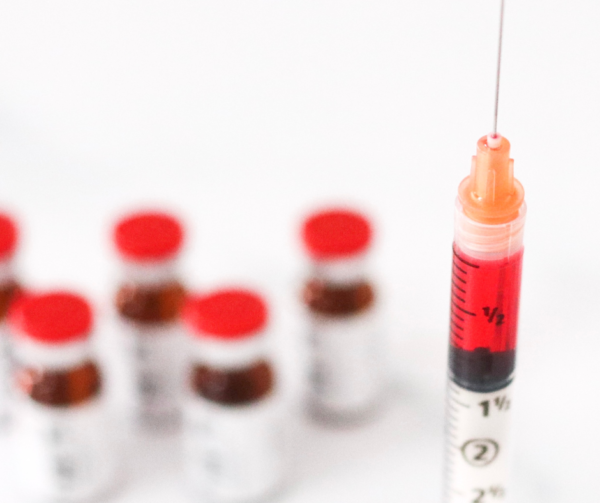
On the other hand, certain medications used to treat Acne, such as Isotretinoin (commonly known as Accutane), can cause a deficiency of vitamin B12, leading to a type of anemia called pernicious anemia.
What is Vitamin B12?
Vitamin B12, also known as cobalamin, is a water-soluble vitamin that plays a critical role in many bodily functions.
It is essential for the formation of red blood cells, DNA synthesis, and proper nerve function. Vitamin B12 is also critical for maintaining a healthy immune system and producing the mood-regulating chemical serotonin.
Vitamin B12 is found naturally in animal-derived foods such as meats, fish, poultry, eggs, and dairy products.
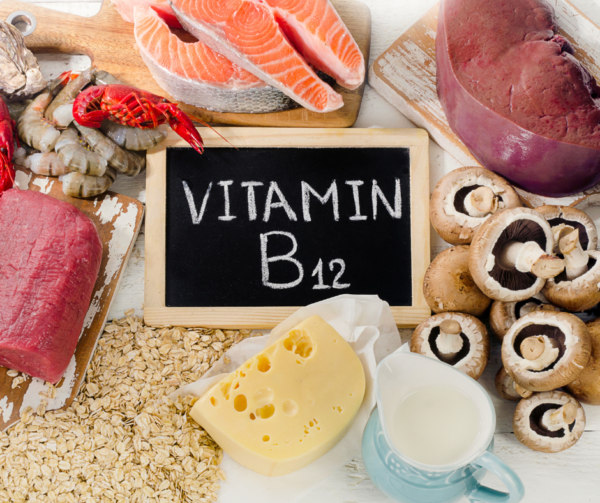
However, it is widely believed that Vegetarians and vegans both are at risk of Vitamin B12 deficiency.
But, this is only partially true!
Vegans may need B12 supplements or consume B12-fortified foods. However, Lacto-Ovo vegetarians who consume dairy and eggs typically get enough B12 from these animal-derived foods.
Milk and other dairy products, such as yogurt and cheese, are excellent sources of protein and several vitamins and minerals, including vitamin B12.
For example:
- One cup (240 ml) of whole milk supplies 46% of the DV for vitamin B12.
- Full-fat plain yogurt can be a good source of vitamin B12; it contains more B12 than low-fat or non-fat varieties. Studies have shown that consuming full-fat yogurt can improve vitamin B12 status in individuals who are deficient in this vitamin.
- Cheese is also a rich source of vitamin B12. One large slice (22 grams) of Swiss cheese contains about 28% of the DV.
- Eggs are a great source of nutrition; they are one of the best dietary sources of complete protein and B vitamins. Eggs are very high in B vitamins such as B2 (riboflavin) and B12 (cobalamin), which are essential for maintaining good health.
Interestingly, studies have shown that your body absorbs the vitamin B12 in milk and dairy products better than the vitamin B12 in beef, fish, or eggs.
The Framingham Offspring Study first observed that vitamin B-12 from milk was better absorbed than meat. The bioavailability of vitamin B-12 from meat is lower than from dairy.
Vitamin B12 deficiency is relatively rare, but it can occur in people with certain medical conditions, such as pernicious anemia, making it difficult to absorb the vitamin from food or supplements.
Symptoms of deficiency include fatigue, weakness, constipation, nerve damage, loss of appetite, weight loss, and anemia.
It’s important to note that the recommended daily intake of vitamin B12 varies depending on age, gender, and pregnancy status.
What can high doses of Vitamin B12 do to you?
Numerous incidences have occurred when a high dose of Vitamin B12 (in the form of supplements or injections) has caused acne breakouts in susceptible or even healthy individuals.
There are reports that Vit B12 & 6, when taken together, caused “Monomorphic Acne,” – many small uniform acne & acne lesions.
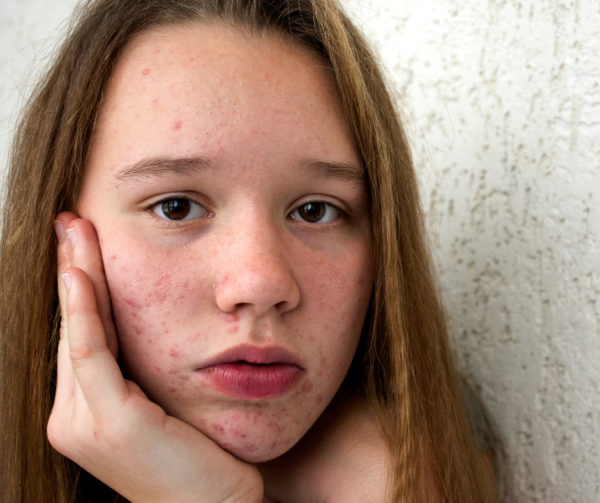
Injections of vitamin B12 don’t cause one or two pimples to break out. Instead, vitamin B12 injections can cause multiple identical Acne all over the face.
Vitamin injections make it easy to identify this kind of Acne because all the pimples will look identical.
The exact mechanism by which high doses of Vitamin B6 and B12 lead to monomorphic Acne is not fully understood.
However, it is considered that these vitamins may cause an increase in the levels of certain hormones, such as androgens, which can trigger the overproduction of sebum. High doses of Vitamin B6 and B12 may also lead to an imbalance in the gut microbiome, which can cause inflammation in the skin and contribute to the development of Acne.
Another theory is that the anaerobic bacteria responsible for developing Acne called Propionibacterium acnes feeds on Vit B12.
When a person receives a high dose of VitB12, it signals the overproduction of P.acnes in the skin, inducing an inflammatory response in the host and leading to numerous acne breakouts.
The most reasonable way to treat acne breakouts caused by vitamin B12 is to reduce or stop taking the supplement.
Sometimes it takes a couple of weeks for these acne breakouts to settle, but unfortunately, sometimes, it takes months to settle down!
Rosacea fulminans is another dermatological condition that high doses of VitB12 & B6 can cause.
Rosacea fulminans is a rare and severe form of rosacea, a chronic skin condition that causes redness and inflammation on the face.
Sudden and severe flare-ups and symptoms such as fever, swollen lymph nodes, and skin tenderness characterize it.
It is not common, but high-dose vitamins B6 and B12 have been reported as triggers for Rosacea fulminans.
The exact mechanism by which high doses of Vitamin B6 and B12 lead to Rosacea fulminans has yet to be well understood.
However, it is believed that these vitamins may cause an increase in the levels of certain hormones, such as androgens, which can trigger the overproduction of sebum.
High doses of Vitamin B6 and B12 may also lead to an imbalance in the gut microbiome, which can cause inflammation in the skin and contribute to the development of Rosacea fulminans.
It’s important to note that while these vitamins are essential for maintaining good health, taking excessive amounts of Vitamin B6 and B12 can lead to adverse side effects.
HOW DO YOU TREAT ACNE EXACCERBATIONS CAUSED BY VITAMIN B12 SUPPLEMENTS/INJECTIONS?
The first thing to remember is if you are experiencing Acne flareups, Rosacea fulminans, or any other side effects after taking high doses of Vitamin B6 and B12.
In that case, it’s important to discontinue use and consult with a healthcare professional as soon as possible.
Acne or other skin issues that develop after vitamin overdose can take a few weeks or months to settle down.
However, some holistic therapies can be helpful :
1: It’s also necessary to pay attention to other factors contributing to your Acne, such as diet, stress, and skincare routine.
Eating a diet rich in fruits and vegetables and low in processed foods and sugar can help improve your skin’s overall health.
Reducing stress through exercise, meditation, or therapy can also be beneficial.
2: You must maintain a good skincare routine; this includes keeping your skin clean by washing your face twice daily with a mild cleanser and using non-comedogenic moisturizers and sunscreens.
3: Probiotics are beneficial bacteria that live in the gut and can help to promote a healthy balance of microorganisms in the gut microbiome. They can help to improve digestion and boost the immune system. Probiotics have been shown to positively impact the gut by reducing inflammation and improving the gut barrier function.
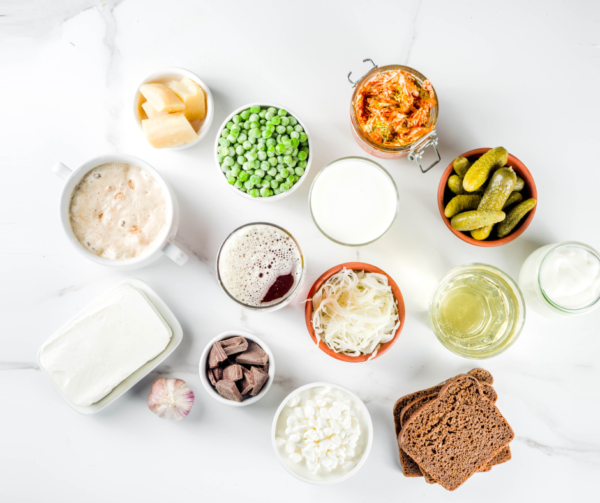
Probiotics can be found in a variety of fermented foods and beverages. Some common probiotic food sources include:
- Yogurt: Look for unsweetened yogurt with live and active cultures, such as Greek yogurt.
- Kefir: A fermented milk drink that contains a variety of probiotic strains.
- Sauerkraut: Fermented cabbage that is a good source of Lactobacillus.
- Kimchi: A spicy fermented cabbage dish that is a staple in Korean cuisine.
- Tempeh: A fermented soybean product that is a good source of probiotics.
- Miso: A fermented soybean paste that is used in Japanese cuisine.
- Kombucha: A fermented tea drink that is rich in probiotics.
- Pickles: Vegetables fermented in vinegar, oil, or brine solution.
Not all fermented foods contain probiotics, so it is always best to check the label or ensure the product is traditionally fermented. Probiotic supplements are also available in the form of capsules and powders.
5: Homeopathic Herbs: Some amazing herbs like Milk thistle, turmeric, ginger, berberry, homeopathic calendula, Nux vomica & Berberis Vulgaris are great for liver & gut detox.
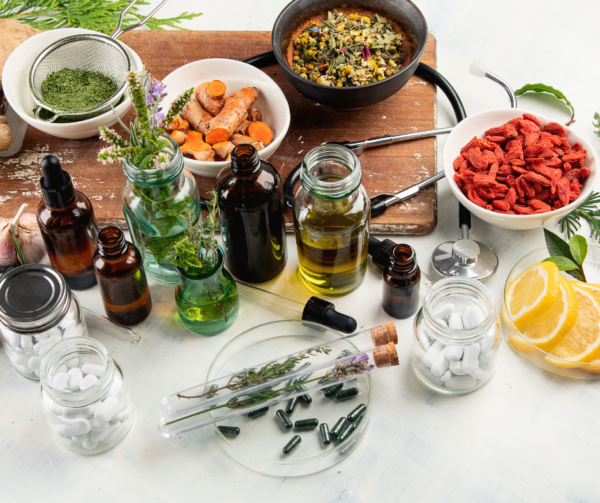
However, these should only be consumed under the guidance of a qualified & experienced homeopathic practitioner.
All the information I shared in this blog provided education about Vit B12 & skin issues; however, it is essential to consult with a healthcare professional if you have any serious health concerns.
If you are dealing with a chronic skin issue And want to know how I can help you, feel free to email me, or you can go ahead & book your appointment directly.
I can assess your condition and provide a comprehensive treatment plan, including any necessary medications, therapies, or lifestyle changes to help manage your condition.
REFERENCES:
https://fdc.nal.usda.gov/fdc-app.html#/food-details/1097542/nutrients
https://fdc.nal.usda.gov/fdc-app.html#/food-details/171265/nutrients
https://www.ncbi.nlm.nih.gov/pmc/articles/PMC6049814/
https://www.ncbi.nlm.nih.gov/pmc/articles/PMC4248518/
https://pubmed.ncbi.nlm.nih.gov/11763399/
https://pubmed.ncbi.nlm.nih.gov/10895516/
https://academic.oup.com/ajcn/article/89/4/1078/4596726?login=false
https://pubmed.ncbi.nlm.nih.gov/11160548/
